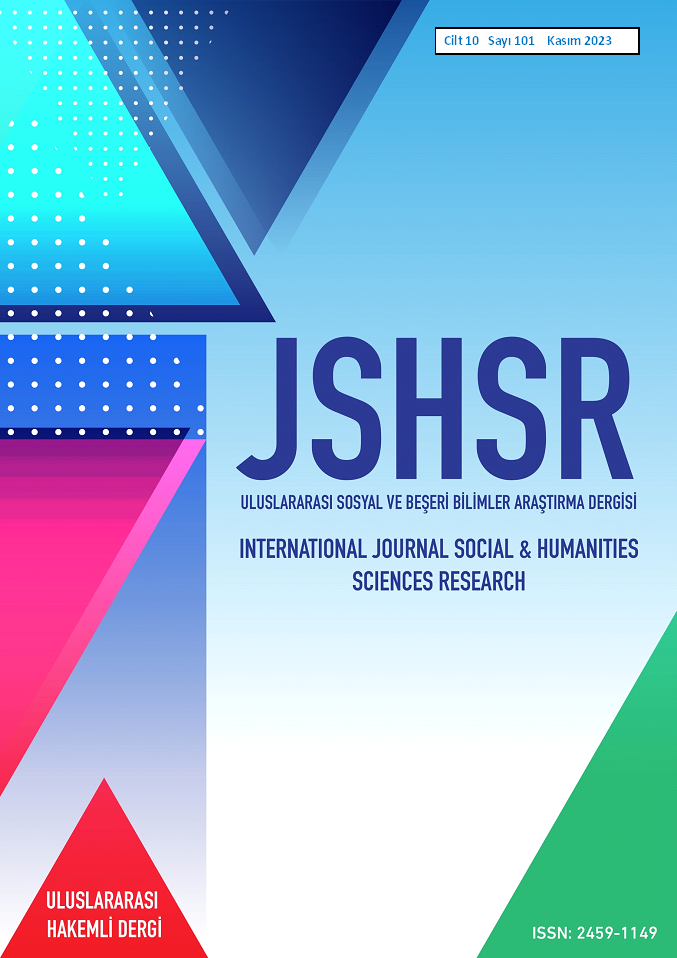The The Metaverse and the Common Source Tragedy; An Essay on Possibilities and Impossibilities
DOI:
https://doi.org/10.5281/zenodo.10256838Keywords:
Metaverse, Common Resource Tragedy, Sustainability, Environmental PollutionAbstract
Nowadays, where technological developments push the limits of dreams, extraordinary transformations are experienced in terms of the interaction of virtual reality and physical reality. In this transformation process, there are radical changes that go beyond the understanding of physical existence that humanity has known and experienced so far. This new layered technology, which digitizes unusual forms of life and interaction and brings them to a virtual space, is called "the metaverse". Metaverse creates a virtual twin of the world based on augmented reality technology, enables the development of new virtual economic systems with blockchain technology, enables the creation of new identities and organization of social networks through powerful communication and avatar identification technologies, and enables the production of content that enables connection with the real world. It is a dimensional technological architecture.
The breadth of Metaverse's technological architecture and its unlimited development potential also cause it to attract attention as a new and profitable investment area in business, education, health, entertainment, trade and military fields. The breadth of opportunities and possibilities offered by Metaverse, along with the possibilities of high earnings and profits, lead to large investments in this field and the emergence of a strong competitive environment. In this context, it is clear that technological investments and industrial production will require significant amounts of raw materials and energy. Uncontrolled and uncontrolled technological development on world resources brings about the problem of extinction of natural resources such as water, atmosphere, electromagnetic spectrum and soil, which are called common goods and directly affect the lives of all people living in the world.
In this study, the process of overconsumption of natural resources that occurs with the increase in investments that support the development of metaverse technology and the widespread use of its applications will be discussed in the context of the tragedy of common resource use theory. Here, it will be noted that the current solutions put forward to overcome this consumption cycle that may result in the destruction of natural resources are generally created with a technocratic approach, but the proposed solutions cannot be solved with a technical understanding, and alternative suggestions for solving the problems that may arise with the uncontrolled use of natural resources will be discussed together with the metaverse.
References
Adams, J. (2009). Quis custodiet ipsos custodes. http://www.john-adams.co.uk/2009/06/23/quis-custodiet-ipsos-custodes/
Aktaş, F., Çeken, C. & Erdemli, Y. E. (2016). Nesnelerin interneti teknolojisinin biyomedikal alanındaki uygulamaları. Düzce Üniversitesi Bilim ve Teknoloji Dergisi, 4(1), 37-54.
Anderson, J. ve Rainie, L. (2022). The metaverse in 2040. Pew Research Centre. https://www.pewresearch.org/internet/2022/06/30/metaverse-predictions-closing-thoughts/.
Brook, Z. & Wade, L. (2023). Metaverse’e geçmeden düşünün. https://www.campaigntr.com/ metaversee-gecmeden-dusunun/.
Bozat, A. U. ve Dedelioğlu C. (2018 Kasım). Artırılmış gerçeklik (AR) -geleneksel ve dijitalin kâğıt üzerinde buluşması. 6. Uluslararası Matbaa Teknolojileri Sempozyumu, İstanbul Üniversitesi, 929-942. https://cdn.istanbul.edu.tr/FileHandler2.ashx?f=929-942.pdf
Cengizhan, M. (2022, 9 Ocak). Metaverse Ekolojik Ve Etik Olabilir Mi?. İklim Gazetesi. https://iklimgazetesi.com/metaverse-ekolojik-ve-etik-olabilir-mi/.
Cui, H., Xu, Z. ve Yao, C. (2022). Will the metaverse be the future of the internet? 8th International Conference on Humanities and Social Science Research (ICHSSR 2022), 2165-2170.
Çelik, E. ve Sağbaş, İ. (2020). Ortak malların yönetilmesi ve ortakların trajedisi. Turkuaz Uluslararası Sosyo-Ekonomik Stratejik Araştırmalar Dergisi, 2(2), 39-50.
De Vries, A (2023). The growing energy footprint of artificial intelligent. Joule, 7(10), 2191-2194.
Eviren, B., Bozkurt, D. ve Yozgatlıgil, C. (2022). Sustainability of metaverse (sustainverse). METU Culture and Convention Center. https://stat.metu.edu.tr/en/system/files/sustainability_of_ metaverse.pdf
Fletcher, J. (1968). Situation Ethics. Westminster Press.
Gürçınar, E. (2021). Genişletilmiş gerçeklik uygulamaları hazırlayan tasarımcılar için temel kullanıcı deneyimi prensipleri. Mimarlık - Şehircilik ve Çevre Sorunları, Prof.Dr. Yıldız Sey'e Armağan içinde (s.124-150). İstanbul Arel Üniversitesi Yayınları.
Hardin, G. (1968). The tragedy of the commons. Science, 62(3859), 1243-1248. DOI:10.1126/science.162.3859.1243
Hegel, G. W. F. (1991). Hukuk Felsefesinin Prensipleri. Sosyal Yayınları.
Jauhiainen, J. S., Krohn, C., Junnila. J, (2022). Metaverse and sustainability: systematic review of scientific publications until 2022 and beyond. https://www.researchgate.net/publication/366596440_ Metaverse_and_sustainability_Systematic_review_of_scientific_publications_until_2022_and_beyond.
Kadıoğlu, S. ve Tellioğlu Z. (1996). Enerji kaynaklarının kullanımı ve çevreye etkileri. TMMOB Türkiye 1. Enerji Sempozyumu, 55-67
Kuş, O. (2021). Metaverse: dijital büyük patlamada fırsatlar ve endişelere yönelik algılar. Intermedia International e-Journal, 8(15), 245-266.
Marshall, G. (1999). Sosyoloji sözlügü. Bilim ve Sanat Yayınları.
Mazuryk, T. & Gervautz, M. (1999). Virtual reality - history, applications, technology and future. Computer science. https://www.researchgate.net/publication/2617390_Virtual_Reality_-_History_Applications_Technology_and_Future.
Mete, M. H. (2022). Metaverse teknolojileri ve etki alanları. Organizasyon ve Yönetim Bilimleri Dergisi, 14(2), 155-171.
McKinsey&Company (2022). Value creation in the metaverse. https://www.mckinsey.com/~/ media/mckinsey/business%20functions/marketing%20and%20sales/our%20insights/value%20creation%20in%20the%20metaverse/Value-creation-in-the-metaverse.pdf.
Mystakidis, S. (2022). Metaverse. Encyclopedia, 2: 486-497
Nakamoto, S. (2008). Bitcoin: a peer-to-peer electronic cash system. https://bitcoin.org/bitcoin.pdf.
Neumann, J. & Morgenstern, O. (1947). Theory of games and economic behavior. Princeton University Press.
Ning, H., Wang H, Lin Y, Wang W, Dhelim S, Farha F, Ding J,Daneshmand, M. (2021). A survey on metaverse: the state-of-the-art, technologies, applications, and challenges. https://arxiv.org/ftp/arxiv/ papers/2111/2111.09673.pdf.
NTV. (2021). BM'den internet raporu: dünyanın yüzde 37'si hiç internet kullanmadı. https://www.ntv.com.tr/dunya/bmden-internet-raporu3-kisiden-1inden-fazlasi-hic-internet-kullanmadi,QoVlhtbAP0-YYiHOH3WLWw.
Ostrom, E., Gardner, R. & Walker, J. (1994). Rules, games and common-pool resources. Michigan Universtiy Press.
Strubell, A. Ganesh & Mc Callum A. (2019). Energy and policy considerations for deep learning in NLP. In Proceedings of the 57th Annual Meeting of the Association for Computational Linguistics,( pp:3645-3650). Florence. https://aclanthology.org/P19-1355.pdf.
ThinkTech-STM. (2022). Metaverse'ün dayandığı teknolojiler. https://thinktech.stm.com.tr/tr/metaverseun-dayandigi-teknolojiler.
Ünal, G. ve Uluyol, Ç. (2020). Blok zinciri teknolojisi. Bilişim Teknolojileri Dergisi, 13(2), 167-175.
Downloads
Published
How to Cite
Issue
Section
License
Copyright (c) 2023 INTERNATIONAL JOURNAL OF SOCIAL HUMANITIES SCIENCES RESEARCH

This work is licensed under a Creative Commons Attribution 4.0 International License.


